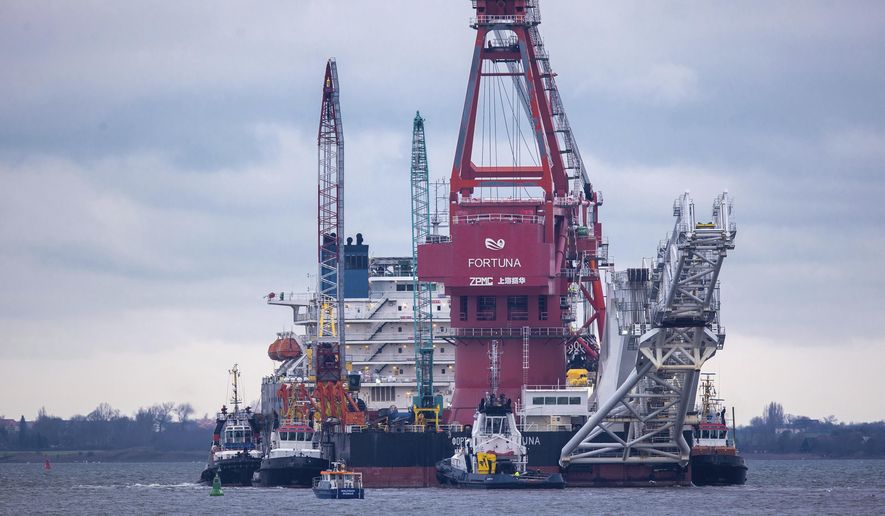Germany officials were celebrating and some on Capitol Hill were fuming as the Biden administration confirmed it was effectively dropping U.S. efforts to block the nearly-completed Nord Stream 2 pipeline supplying Russian natural gas directly to Germany.
Despite earlier vows to block the project, the administration has decided that it will waive sanctions for the German company overseeing construction of the pipeline and its CEO, despite growing complaints from Congress and from many of Germany’s European neighbors that the pipeline is politically and economically unwise.
The administration is expected to go ahead with sanctions on eight Russian ships and companies involved in the project, but waive penalties for the German firm on nation security grounds, a move welcomed Wednesday by German Foreign Minister Heiko Maas.
“We perceive this to be a constructive step that we will gladly continue to discuss with our partners in Washington,” Mr. Maas told reporters in Berlin. The government of Chancellor Angela Merkel has pushed ahead with the deal despite the open opposition of both the Trump and Biden administrations.
“We understand the decision that was made in Washington to be one that takes into consideration the really extraordinarily good relations that have been established with the Biden administration,” Mr. Maas added, according to the Associated Press.
Critics have warned the nearly completed pipeline will give the Kremlin too much leverage over Western energy supplies and undermine Ukraine’s status as the key transit route for Russian oil and natural gas being sold in Europe.
Both Secretary of State Antony Blinken and Deputy Secretary of State Wendy Sherman pledged to fight the project in their confirmation hearings earlier this year.
“I will do everything I possibly can to ensure that Nord Stream 2 does not go forward,” Ms. Sherman told a Senate Foreign Relations Committee hearing in March.
But Mrs. Merkel’s government persisted and U.S. officials expressed growing fears that U.S. sanctions would anger Berlin without stopping the nearly-complete project from going forward.
The geopolitics surrounding Nord Stream 2 have long been vexing, as Germany has faced internal debates over the value of the pipeline to ease the energy needs of its own people as well as other populations across Western Europe.
U.S. lawmakers in late 2020 ordered the White House to deliver an assessment to Congress on companies involved in Nord Stream that may be subject to sanctions. While the legislation set in motion the process for authorizing the president to level sanctions against Russian and German firms, it does not explicitly mandate such sanctions.
Secretary of State Antony Blinken and Mr. Maas spoke by phone Tuesday and Mr. Blinken again cited Washington’s unhappiness with the project.
Mr. Blinken “underscored the U.S. commitment to work with allies and partners to counter Russian efforts to undermine our collective security, and in that vein, emphasized U.S. opposition to the Nord Stream 2 pipeline,” the statement said.
Construction work halted for nearly a full year in December 2019 when the Trump administration was considering whether to apply new sanctions on the construction firms, but resumed again in December 2020. The pipeline is said to be about 95% completed.
News of the sanction waiver was first reported late Tuesday by Axios.com.
Both Democrats and Republicans on Capitol Hill condemned the Biden administration’s retreat.
“Two months ago, President Biden called [Russian President Vladimir] Putin a ‘killer,’ but today he’s planning to give Putin, his regime, and his cronies massive strategic leverage in Europe,” Sen. Ben Sasse, Nebraska Republican, said in a statement. “You can’t pretend to be a Russia hawk but then just roll over.”
Senate Foreign Relations Committee Chairman Robert Menendez, New Jersey Democrat, said Wednesday the move has “created uncertainty in many corners of Europe” and added he would press administration officials on the decision and how it could negatively affect Ukraine.
Sen. Jeanne Shaheen, a New Hampshire Democrat who sits on the foreign relations panel, said she was disappointed by the administration’s move.
“Completion of this pipeline poses a threat to U.S. security interests and the stability of our partners in the region,” she said in a statement
This article was based in part on wire service reports.
• David R. Sands can be reached at dsands@washingtontimes.com.
• Guy Taylor can be reached at gtaylor@washingtontimes.com.




Please read our comment policy before commenting.